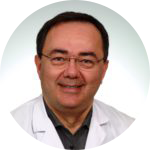-
Hearts out of rhythm
-
Cardiologist Firat Duru is investigating a particularly insidious form of cardiac arrhythmia. Primarily affecting young people, so far it has been more or less impossible to diagnose, and often ends fatally. Duru wants to improve the diagnostics so that the condition is detected earlier on and more patients survive.
-
 «I had no idea I was sick.»
«I had no idea I was sick.»It happened during a game of football: nineteen-year-old student Fabio Bühler* suddenly collapsed. Without warning, his heart had fallen out of rhythm and stood still. If bystanders hadn’t given him vigorous resuscitation, he wouldn’t be alive today. He now has an implanted defibrillator to restore his cardiac activity to normal in an emergency with powerful electric shocks.
It’s the same for most people who, like him, suffer from arrhythmogenic right ventricular cardiomyopathy (ARVC). “Unfortunately, sudden cardiac death is often the first sign of the disease,” explains Professor Firat Duru. The Head of Rhythmology at the Department of Cardiology at University Hospital Zurich (USZ) has been researching this disease of the heart muscle with his colleague Corinna Brunckhorst since 2011. The condition is quite rare, and so far has been the subject of little research. It manifests itself as life-threatening cardiac arrhythmia or cardiac insufficiency, and very often affects young people. The cardiologist wants to improve diagnosis of the disease so that anyone with the condition can enjoy a long life.
“All we know so far is that in most cases ARVC is inherited, and that factors such as sport can trigger the arrhythmia,” explains Duru, whose scientific work on AVRC has already earned him and his research group multiple awards. “But to date there has been no test to make a sure diagnosis.” He hopes to be able to put together a set of unequivocal diagnostic criteria applied, for example, when measuring cardiac function. Ideally he’ll also manage to identify ARVC-specific biomarkers, in other words clearly measurable biological parameters. In addition he’d like to improve imaging and the EKG procedure for diagnosing ARVC.
For this research it’s crucial to evaluate as much patient data as possible to get a full picture. That’s not easy for what is a fairly rare condition. Thanks to a gift to the USZ Foundation from businessman Hans-Peter Wild, since summer 2018 Duru has been setting up a cooperation with the prestigious Johns Hopkins University in the United States. “We’re in the process of merging our register of Swiss patients with their register,” the cardiologist explains. Together the researchers will develop a risk model for ARVC. “These patient data will take our research an important step further.”
*anonymized
100% financed

-
-
Project management
-
-

Prof. Dr. Firat Duru
Head of Rhythmology
Department of Cardiology
University Hospital Zurich -

Prof. Dr. Corinna Brunckhorst
Deputy Head of Rhythmology
Department of Cardiology
University Hospital Zurich
-
-
Supporting partner
-
-
Dr. Hans-Peter Wild
